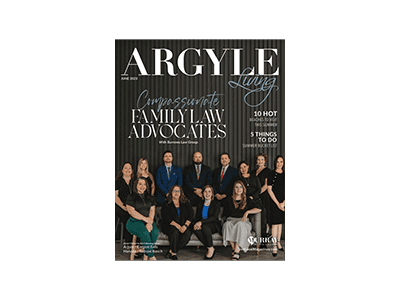




Little Elm Family Law Attorney
Divorce Lawyers in Little Elm, TX
The divorce process can be both a difficult and chaotic time for people. Your life is changing, and you still have crucial negotiations on matters ranging from property division to child custody and visitation to spousal maintenance. An experienced divorce lawyer is there to make sure the right questions get asked, the right information is presented to the court, and to fight for your best interests.
A qualified family lawyer in Little Elm can guide you through the complexities of the settlement process. Call us at (972) 236-7798 or contact us online today.
Understanding Property Division Laws in Little Elm
Community Property vs. Equitable Distribution
Texas uses the principle of community property to guide the division of assets in a divorce settlement. This means that property jointly owned by both spouses needs to be divided on a reasonably equal basis.
It’s important to note that Texas is unique in this regard—41 states use the principle of equitable distribution. While these concepts are similar, a community property state like Texas provides less flexibility to judges in determining what is equitable.
Clarifying Marital and Separate Property
So, it’s a 50/50 split then, right? Maybe. But let’s not get ahead of ourselves. Community property rules only apply to that which is jointly owned. Courts make a distinction between marital property and separate property.
This does not mean that your income and your spouse’s income are separate property. The distinction between marital property and separate property is not necessarily who earned the money (or acquired the asset), but when it was earned or acquired.
Little Elm Family Law Attorney's Role in Asset Review
Assets that you or your spouse brought into the marriage are considered separate property. Anything gained or acquired after the marriage is marital property. Therefore, if your spouse got a promotion at work five years ago and has been stashing cash into their 401(k), that is still an asset that belongs equally to you. It’s your divorce lawyer’s job to make sure all assets are reviewed, and your rights are protected on each and every one.
In addition, it is crucial to understand the role that debts play in property division. Just as assets are categorized as either community or separate property, so too are debts. Debts accrued during the marriage are typically shared, while those incurred before the marriage often remain with the original debtor.
Furthermore, a capable family law attorney will also look at hidden assets and income streams. With many years of practice, Burrows Law Group can assure you that a thorough financial investigation will be conducted, ensuring a fair distribution of both assets and liabilities.
Child Custody & Visitation Plans in Little Elm
Physical Custody vs. Legal Custody
Your divorce settlement will have two different custody issues to resolve. The first one is physical custody, which refers to where your children will live. Will there be one primary custodial parent, with the other parent getting visitation rights? Or will there be joint custody where the kids take turns living at each parent’s house?
There is also the matter of legal custody. Someone still has to make big decisions regarding your children’s lives. Where will they go to school? What happens if an important medical decision has to be made? Will the kids have a religious upbringing? These are the types of decisions that are grouped into the category of legal custody.
Ensuring the Child's Best Interests in Little Elm, TX
A Texas family court will have the best interests of the child as the overriding consideration in custody cases. The court will start with a presumption that those best interests are served by the parents having equal custody. But presumptions in a court of law can be challenged.
If you were the spouse who sacrificed in your career to be home with the kids, your lawyer can make the case that the best interests of the children are served by living with you full-time. Your soon-to-be ex would still have visitation rights, of course, but you could get primary physical custody under circumstances like these.
Or perhaps you were the spouse that had to bring in the income and needed to be at the office when you might have preferred to be at an extracurricular activity. Now, your soon-to-be ex is leaving the area for a job. Your lawyer can make the case that the interests of the children are served by staying in the town and school district they grew up in.
Standard Possession Orders & Customization
One thing to note—getting primary physical custody does not automatically lend itself to primary legal custody. Judges are often quite open to the idea of shared legal custody on big decisions, while granting primary physical custody to one parent, in the interests of stability for the children.
Every case is different, and all family relationships have a unique dynamic. It’s your attorney’s role to make sure your side of that story gets told to the court. It is also important to understand the nuances of establishing visitation schedules. The 'standard possession order' commonly used in Texas provides a starting point, often granting the non-custodial parent weekend, holiday, and summer visits. However, schedules can be adjusted for special circumstances such as parental work schedules, children's extracurricular activities, and other family-specific needs.
A skilled family law attorney will help customize a plan that truly reflects the unique needs of your family while also integrating flexibility to manage unexpected situations.
Spousal Maintenance Considerations in Texas
Understanding Spousal Maintenance
Spousal maintenance—or alimony, as you may have heard it colloquially referred to as—is aimed at allowing both spouses to meet living expenses after the divorce, even if one of them earned a significantly higher income during the marriage.
Texas spousal maintenance orders are structured in a way that encourages both spouses to become financially independent of each other, while recognizing that the unique dynamics of the marriage may put one spouse at an economic disadvantage.
Factors Influencing Maintenance Decisions
The most common example is one spouse staying home with children and putting a career on hold. A spousal maintenance agreement in situations like this will consider the job skills of the stay-at-home spouse, the current market for employment, and what will be necessary for them to ramp up and earn an income that will allow them to live the lifestyle they enjoyed during the marriage. A part of this evaluation will include whether or not the spouse will still be taking care of young children after the divorce.
Texas courts will consider a range of other factors. The length of the marriage will be one consideration. There are also situations where one spouse may have helped the other with financial investments in their career. Perhaps the higher-earning spouse enjoys that advantage because they got an MBA that was paid for with marital property. The lower-earning spouse needs to be made whole in the divorce settlement.
Reviewing and Adjusting Maintenance Orders
Ultimately, spousal maintenance in Texas will typically end after ten years—at most. The only cases where the maintenance order might go longer are extraordinary situations. An example might be a spouse caring for a developmentally disabled child, with getting a career off the ground implausible under these circumstances. The consideration of each spouse’s contributions to the marriage, both financial and otherwise, should not be underestimated. Non-monetary contributions, such as homemaking and supporting a spouse’s career, factor significantly in determining the necessity and length of spousal support.
Likewise, changes in circumstances post-divorce, such as improved employment prospects for one spouse or health challenges, might necessitate a revisit of the spousal maintenance order. It’s essential to have a legal advisor to navigate such potential alterations and ensure fairness throughout the duration of the order.
Every person is unique. So is every marriage and every family. That means no divorce settlement can be exactly the same. And that means the quality of your settlement may well depend on the quality of the attorney you work with. Burrows Law Group has been doing this for over 25 years. We won’t say we’ve seen it all, but we’ve seen a lot more than most. We know how to prepare and what to look for in a divorce case.
Choosing the Right Family Law Attorney in Little Elm
Finding the Right Lawyer
When facing a family law issue, it’s essential to seek legal representation to protect your rights and achieve the best possible outcome for your case. Family law matters can be emotionally challenging and legally complex, so having the right attorney by your side can make a significant difference.
The first step in finding a family lawyer is to research attorneys in your area who handle family law. Look for a lawyer with experience handling cases similar to yours, whether it involves divorce, child custody, or property division. It’s important to choose an attorney who understands Texas family law and has a track record of success in court or negotiations.
Initial Consultation Process
After narrowing down potential attorneys, schedule a consultation. During this initial meeting, be prepared to discuss the specifics of your case, your goals, and any concerns you may have. This is also an opportunity to assess the lawyer’s communication style, knowledge, and ability to handle your case effectively. A good attorney should offer clear guidance on your legal options and what to expect moving forward.
Gathering documentation before your consultation is crucial. This may include financial records, legal documents, or communication related to your case. The more prepared you are, the better your attorney can advise you.
Working with Your Family Lawyer
Finally, once you decide on a family lawyer, be prepared to work closely with them throughout your case. Regular communication and full transparency with your attorney will ensure that your rights are protected and your interests are represented. With the right legal support, you can confidently navigate any family law issue.
A comprehensive approach involves not only focusing on the immediate concerns but also considering the long-term implications of legal strategies. An accomplished family law attorney will discuss potential future changes, like relocation due to job changes or evolving financial situations, ensuring that your settlement or custody arrangements remain beneficial.
In addition, ask about the attorney’s network of resources, such as financial planners or counselors, which can be essential in constructing a robust support system to address all facets of a family law matter.
FAQ About Family Law in Little Elm, TX
What Represents “Best Interests of the Child” in Little Elm Family Court?
In Little Elm family court, the “best interests of the child” is a fundamental consideration for custody and visitation arrangements. Courts look at various factors, including the child's emotional and physical needs, the ability of each parent to provide for these needs, and the children's wishes, especially if they are over a certain age. Stability is a priority, so the court may favor a scenario that offers consistency in education, community ties, and living arrangements. Parents' conduct and any history of neglect or abuse are critically examined to ensure a safe environment.
How does Burrows Law Group approach these considerations? With extensive local experience, our attorneys focus on presenting a full picture of the family situation, advocating for solutions that genuinely align with the child's welfare. This might include negotiating terms that allow flexibility while prioritizing the child’s secure environment and consistent routine. We always strive to reflect the values and best dynamics for your household while meeting legal standards required by Little Elm courts.
How Are Marital Assets Divided by Little Elm Courts?
In Little Elm, as is the case throughout Texas, marital assets are divided based on community property law. This implies that assets and debts acquired during the marriage belong equally to both spouses and are subject to division upon divorce. Exceptions exist for properties considered separate, such as possessions owned before the marriage or received as gifts or inheritances.
The division process is rarely straightforward, as factors like fault in the breakup, discrepancies in earning capacity, and health or age differences might come into play. At Burrows Law Group, we focus on detailed evaluations and thoughtful presentations of asset portfolios. Our goal is to help our clients receive a fair portion reflective of their contributions and future needs. This personalized approach recognizes the distinct considerations present in every marital asset division case within Little Elm.
What Should I Expect from a Child Custody Evaluation?
In contentious custody disputes, Little Elm courts may order a child custody evaluation. This process aims to assess each parent's ability to care for their child, basing recommendations on exhaustive reviews of the family’s situation and dynamics. Evaluators often conduct home visits, interviews with parents, children, and sometimes other family members, and review relevant documentation such as school records or medical history.
It is vital to present oneself authentically during these evaluations, as they weigh heavily in custody decisions. At Burrows Law Group, we advise clients on preparing for these assessments, ensuring they effectively convey their dedication to their children's best interests without resorting to trying to “game” the system. Our attorneys work closely with clients to offer constructive guidance, helping them navigate the intricacies of the evaluation process confidently.
What Is a Standard Possession Order in Little Elm?
In Little Elm, a Standard Possession Order (SPO) often forms the basis for visitation schedules following a divorce, presuming it serves a child’s best interest. The SPO typically allows the non-custodial parent visits on specific weekends, a rotating holiday schedule, and extended summer visitations. However, this order can be modified based on unique family circumstances such as parental work commitments or children's school activities.
At Burrows Law Group, we aim to tailor these orders to better reflect our client's lifestyle and the practical needs of the family. We work diligently to advocate for terms that support a healthy balance between parental access and a child’s stability, always keeping the child’s continuity and comfort as a paramount concern.
How Do Little Elm Courts Handle Domestic Violence in Family Law Cases?
Little Elm, TX courts take allegations of domestic violence very seriously when deciding family law matters. Protective orders can be issued to protect victims from alleged abusers, influencing custody and visitation rights. Such cases may lead to supervised visitations or, in severe instances, the termination of parental rights if deemed necessary for the child’s safety.
Burrows Law Group prioritizes the safety of families in these situations and works meticulously with clients to ensure their legal rights are protected. We assist in the process of seeking protective orders and actively work to secure a safe and stable environment for affected clients and their children. Our focus remains on proactive, informed responses that adhere to Little Elm's legal framework while safeguarding our clients’ welfare.
Reach our Little Elm family law and divorce lawyers at (972) 236-7798 or reach out online and let us help you next.
An Experienced Team
You Can Trust
-
 Adam Burrows President & CEO
Adam Burrows President & CEO- Family Law,
- Small Business Formation
-
 Dr. Jessica Burrows In-House Counselor, Chief Financial Officer
Dr. Jessica Burrows In-House Counselor, Chief Financial Officer -
 Daniel Dower Attorney at Law
Daniel Dower Attorney at Law- Family Law,
- Small Business Formation
-
 Jennifer Hicks Attorney at Law
Jennifer Hicks Attorney at Law- Family Law,
- Child Custody,
- Adoption,
- Divorce,
- Prenuptial Agreements,
- Property Division,
- Restraining Orders,
- Same Sex Marriage
-
 Brielle Ward Senior Attorney
Brielle Ward Senior Attorney- Family Law
-
 Vanita Aphan-Kirkland Attorney at Law
Vanita Aphan-Kirkland Attorney at Law -
 Hollie Ritchie Attorney at Law
Hollie Ritchie Attorney at Law -
 Dale A. Burrows Of Counsel
Dale A. Burrows Of Counsel- Family Law
-
 Lily Lord Paralegal
Lily Lord Paralegal -
 Jennifer Mulford Legal Assistant/Billing Coordinator
Jennifer Mulford Legal Assistant/Billing Coordinator -
 Christian Mathis Firm Administrator/Intake Specialist
Christian Mathis Firm Administrator/Intake Specialist -
 Madison Duehr Family Law Paralegal
Madison Duehr Family Law Paralegal -
 Melissa Ruden Board Certified Paralegal
Melissa Ruden Board Certified Paralegal



































